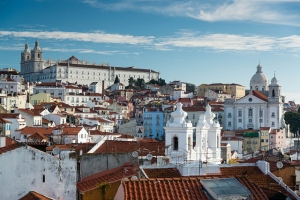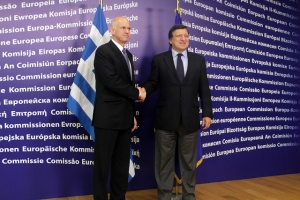Support migrant centric journalism today and donate

 Watch This Video
Watch This VideoIn a recent interview, Romanian President Traian Basescu said that he expects a potentially large wave of immigration from neighboring Moldova because of Romania's recent accession to the European Union. He said the only way to avoid such a trend was to give Moldovan citizens "a European perspective," meaning hope of EU membership for their country in the future.
He recently discussed this and other issues in Brussels with EU Commission President Jose Manuel Barroso and Vice President Franco Frattini.
According to Basescu, there are currently 800,000 applications for Romanian citizenship from Moldovans. Romania expects 1.5 million by the end of the year. Moldova is considered to be the poorest nation of all Europe, with a population of just under 4.4 million, according to July 2006 estimates.
Until the end of World War II, Moldova was a part of Romania. As the war ended, Russia used the Ribbentrop-Molotov pact with Hitler to split Moldova off from Romania, incorporating the former southwest Ukrainian Bessarabia territory to form the Moldavian Soviet Socialist Republic.
The former Moldovan territory intimately shares the language and culture of Romania, while the former Bessarabia territory (now referred to as the Trans-Dniester or the Dniester region) is largely comprised of ethnic Ukrainian and Russian peoples, both in culture and language.
Further complicating the situation, Russia currently maintains a significant military force in the Trans-Dniester region, sandwiched east of the Dniester River and west of the Ukraine border.
Approximately 25% of working age Moldovans are estimated to be working outside of the country, and the government recently announced plans to open two new consulates to help deal with the backlog of Moldovans who wish to emigrate.
In a related issue, Basescu blamed EU employers for hiring Romanians illegally and paying them low wages.
"Not only Romanians are guilty, but, at least as guilty are the employers of the EU countries who illegally employ them on low salaries," Basescu said. Estimates late last year indicated that up to 600,000 Romanians were working in Spain illegally, in addition to 200,000 legal immigrant workers.
He also criticized Britain for placing restrictions on Romanians working in the United Kingdom. The restrictions were imposed for Romania and Bulgaria when they joined the EU on 01 January 2007.
"What we are upset about is the different treatment for Romanians and Bulgarians working in the UK, compared to the first 10 countries which joined the Union in 2004," he said.
According to Britain's Deputy Prime Minister, John Prescott, the restrictions were temporary and that Romanians would have full access to the British labor market in the future.
Related:
• Moldova to get two new consulates• Profile of new EU-27 nation, Romania
• Romania and Bulgaria lobby the UK for open-doors
• Bulgaria and Romania join the European Union
• UK immigration flow regulations approved for Romania and Bulgaria
• Spain may already have 600,000 illegal Romanians





















